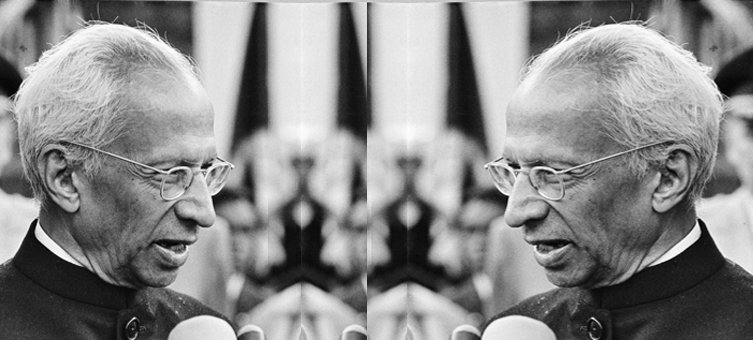Archives of Contemporary India
Supported by HDFC LTD.

An accomplished scholar, author, teacher, and philosopher statesman, Dr. Sarvepalli Radhakrishnan (b.1888–d.1975) was the second President of India from 1962 to 1967.
Radhakrishnan was born in Tirutani, Andhra Pradesh into a Brahmin family. He had his early education at Tirupati and Vellore. He graduated from Madras Christian College (1907) and also finished his Masters from the same college (1909). He started his distinguished career in teaching by joining the Department of Philosophy at Madras Presidency College (1909) and then as a Professor of Philosophy at the University of Mysore (1918), after two years he joined the University of Calcutta (1920).
In 1921, Radhakrishnan took up the prestigious George V Chair in Philosophy at Calcutta University. He was invited to Oxford to give the 1926 Upton Lectures, published in 1927 as The Hindu View of Life, and in 1929 Radhakrishnan delivered the Hibbert Lectures, later published under the title An Idealist View of Life. Radhakrishnan was knighted in 1931, the same year he became Vice Chancellor of the newly founded, Andhra University at Waltair. He served there for five years and in 1936, Oxford University appointed him to the H.N. Spalding Chair of Eastern Religions and Ethics.
In late 1939, Radhakrishnan took up the Vice Chancellorship at Benares Hindu University (BHU), and served there till mid-January 1948. Shortly after his resignation from BHU, Radhakrishnan was named Chairman of the University Education Commission. The Commission’s 1949 Report assessed the state of university education and made recommendations for its improvement in the newly independent India.
Radhakrishnan was actively involved in UNESCO, serving on its Executive Board as well as leading the Indian delegation from 1946-1951. He also served for two years as a member of the Indian Constituent Assembly. In 1949, Radhakrishnan was appointed as Indian Ambassador to Moscow, a post he held until 1952. With his election to the Rajya Sabha, he served as India’s Vice President (1952-1962) and later as President (1962-1967).
Dr. Radhakrishnan’s philosophy was grounded in Advaita Vedanta and throughout his life and extensive writing career, he sought to define, defend and promulgate Hinduism and demonstrate that it was both philosophically coherent and ethically viable. He defended Hinduism against what he called ‘uniformed Western criticism’ and earned a reputation as a bridge-builder between India and the West.
Dr. Radhakrishnan dedicated his life to the betterment of education in the country. Education according to him was acquiring of knowledge beyond what is academic and professional. His birthday is celebrated as Teacher’s Day on 5 September every year all over India since 1962.
Dr. Radhakrishnan was honoured with the Bharat Ratna in 1954, honorary membership of the British Royal Order of Merit in 1963, and the Templeton Prize for Progress in Religion (USA) in 1975.
He spent the last eight years of his life at his home ‘Girija’ in Mylapore, Madras (now Chennai). Radhakrishnan died on April 17, 1975.
A distinguished philosopher and prolific writer, Dr. Radhakrishnan authored several books including The Essentials of Psychology (1911), The Philosophy of Rabindranath Tagore (1918), The Reign of Religion in Contemporary Philosophy (1920), Indian Philosophy, Vol. I, Vol. II (1923, 1927), The Hindu View of Life (1926), An Idealist View of Life (1929), Eastern Religions and Western Thought (1939), Religion and Society (1947), The Bhagavadgita (1948), The Principal Upanishads (1953), and Religion, Science and Culture (1968).
About the Collection: The papers of Dr. S. Radhakrishnan, donated by Mrs. Indira Gopal (daughter-in-law of Dr. S. Radhakrishnan), were collected from his home ‘Girija’ in Chennai in 2018. The papers are a huge treasure trove of historical material dating back to almost a hundred years with very rare and original documents. The papers relate to his stint as King George V Chair of Mental and Moral Science at Calcutta University, 1921-32, Spalding Professor of Eastern Religion and Ethics and Fellow, All Souls College, Oxford University, 1936-1952; Vice Chancellor of Andhra University, 1931-36, and Banaras Hindu University, 1939-48; Indian representative at UNESCO, 1946-52; Ambassador to USSR, 1949-52; and his tenure as Vice President, 1952-62, and President of India, 1962-67. Besides correspondence with his contemporaries, the collection also contains material related to his publications, handwritten notes, drafts/manuscripts of writings, articles/lectures and speeches on religion and philosophy. There are also rare books, journals, pamphlets, photographs and photo albums. The papers cover the tenure of three Prime Ministers in post-independent India and open up new avenues of study and research of the initial years of the Indian republic. (Catalogue I, II & III available) (Catalogue IV available, Vice-President, 1952-57 & 1957-1962)